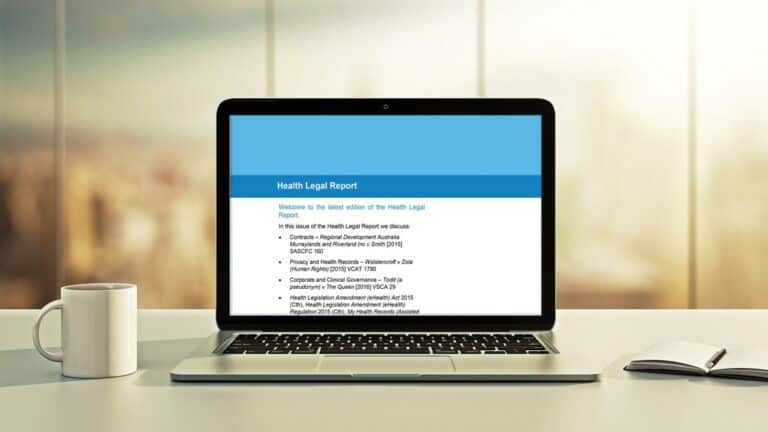This article applies to health care establishments that do not provide voluntary assisted dying services in New South Wales.
Voluntary Assisted Dying Act 2022 (NSW)
The Voluntary Assisted Dying Act 2022 (NSW) commenced on 28 November 2023.
Background
After considered and prolonged debate, the New South Wales Parliament passed the Voluntary Assisted Dying Act 2022 (NSW) (the Act) on 19 May 2022, with the Act coming into force on 28 November 2023.
The Act provides for access to voluntary assisted dying for adults with decision-making capacity who are suffering from an incurable disease or illness that is expected to cause deaths in six months or less (or 12 months in the case of a neurodegenerative disease), where the suffering cannot otherwise be alleviated in a way that is acceptable to the person. In practice, this means the person can gain access to a lethal dose of medication (called a voluntary assisted dying substance in the Act) that will cause death when ingested, or for a person to have such a substance administered to them by a medical practitioner upon request, where the person is unable to self-administer.
This training brochure provides on overview of key elements of the voluntary assisted dying process under the Act as they relate to health care establishments.
Participation
Section 89 of the Act provides that a health care establishment may decide they will not provide services relating to voluntary assisted dying at the establishment. The decision not to provide services relating to voluntary assisted dying is subject to conditions imposed by Part 5 of the Act on a health entity in relation to persons receiving health care.
A health care establishment is defined to mean:
- a private health facility within the meaning of the Private Health Facilities Act 2007 (NSW); or
- a public hospital within the meaning of the Health Services Act 1997 (NSW).
A health entity is defined to mean an entity that owns or operates a health care establishment.
Information about non-availability of voluntary assisted dying services
Section 107 of the Act provides that where a health entity does not provide voluntary assisted dying services, that information must be published in a way that it is likely to inform people who receive the entity’s services, or who may receive the entity’s services in the future, for example, in a printed brochure, on the entity’s website, or displayed on signs at the facility.
Request for information and access to information
Under section 99 of the Act, access at a health care establishment to information about voluntary assisted dying must not be hindered and reasonable access must be given to a registered health practitioner, care navigator or other person upon request of a person receiving health care from the health care establishment.
Requests (first and final)
Section 101 of the Act provides that when a health entity receives advice that a person wishes to make a first or final request for voluntary assisted dying, the entity must take reasonable steps to facilitate the person’s transfer to and from a place the request can be made.
Assessments (first, consulting, referrals)
Pursuant to sections 102 and 103 of the Act, where a person has:
- a first request for voluntary assisted dying and they wish to undergo a first assessment; or
- undergone a first assessment and they wish to undergo a consulting assessment,
- the health entity must take reasonable steps to facilitate the person’s transfer to and from a place where the assessment may be carried out.
Written declaration
Section 104 of the Act provides that when a health entity receives advice that a person wishes to make a written declaration, the entity must take reasonable steps to facilitate the person’s transfer to and from a place the written declaration can be made.
Administration decision
Under section 105 of the Act, when a health entity receives advice that a person wishes to make an application for an administration decision, the entity must take reasonable steps to facilitate the person’s transfer to and from a place where the administration decision can be made.
Self-administration or practitioner-administration of voluntary assisted dying substance
If a person has made an administration decision and a health entity has been advised of the person’s wish to self-administer or have their administering practitioner administer the substance, the health entity must take reasonable steps to facilitate the person’s transfer to a place where the person can either self-administer the voluntary assisted dying substance or can be administered the substance [section 106 of the Act].
Storage and disposal of voluntary assisted dying substances
Under regulation 128E of the Poisons and Therapeutic Goods Regulation 2008 (NSW), a voluntary assisted dying substance kept at a health care establishment on behalf of a patient must be stored in a steel box and be kept:
- in a securely locked storage room when not in immediate use; or
- in a safe, cupboard, or other receptacle that is securely attached to the establishment or facility and securely locked when not in immediate use.
Conclusion
Health services in New South Wales that do not provide services relating to voluntary assisted dying should ensure they are aware of the new voluntary assisted dying law and update their systems and processes to implement the changes in full.




